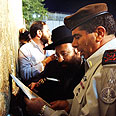

Keeping with tradition: A majority of the Jewish public declared that they intend to fast or, at the very least, to avoid going out with friends on Tisha B'Av, the day marking the destruction of the First and Second Temples, according to a Ynet-Gesher poll conducted ahead of the holy day.
As part of the self-examination and introspection of "unfounded hatred" (sinat hinam) within Israeli society, the reason Jewish tradition cites as the reason for the destruction of the Temple, Arabs, haredim, settlers, and Tel Avivians compete for the title of "the most hated" in Israel 2010.
The poll was conducted by market research company Panels and surveyed 505 respondents statistically representative of the adult, Hebrew-speaking population in Israel living in Jewish towns. The maximum sampling error is 4.4%±.
The first question asked was: "If it were permissible by law to open recreational spots on the eve of Tisha B'Av, would you go out to have fun?"
Fifty-two percent of the respondents said they would forego recreational activity on this day even though they do not fast, whereas 22% responded that they fast and therefore would not go out in any case. Another 18% responded that they would go out on the eve of the fast day and labeled the current legal status "religious coercion." Another 8% declined to answer.
Breaking down the responses based on religious affiliation shows that a majority of all sectors either fast or, at the very least, respect the tradition of mourning on Tisha B'Av by not going engaging in recreational activity.
In response to the question "Which among the following groups in your opinion is the most hated in Israeli society?" 54% chose Arabs, 37% chose haredim, 8% chose religious, and 1% chose Tel Avivians. An analysis of the data reveals that the haredim themselves believe that they are the most hated, whereas religious, traditionalists, and seculars responded that Arabs are more hated.
The poll also asked the respondents to indicate honestly which of the four groups is the least liked by them personally. Arabs topped the list with 52% and haredim were in second place with 32%. Some 11% responded they least like settlers, and 5% said they least like Tel Avivians. A breakdown of the results shows that haredim, religious, and traditionalists mainly dislike Arabs, whereas seculars mainly dislike haredim.
Worst source of tension
In conclusion, the poll posed the question: "Tisha B'Av symbolizes 'unfounded hatred.' What, in your opinion, is the worst source of tension in Israeli society?" To this question, 42% indicated the religious-secular issue and 41% indicated the Jewish-Arab issue. Nine percent believe that tension between settlers and the rest of the country is the largest source of tension, and 8% responded the tension between rich and poor.
The haredi public is the only sector in which a vast majority believes the religious-secular issue to be the most significant source of tension in Israelis society. Traditionalists also indicated the religious-secular divide, though this option received less than half of the votes. Seculars indicated the tension between Jews and Arabs, and religious were divided between the two.
Ilan Geal-Dor, a member of Gesher's board, responded to the findings. "The haredim, from within the Jewish population of the State of Israel, are the most hated. Furthermore, a majority of the public feels as though the tension between haredim and seculars is the worst source of tension, even more than with Arabs. We at Gesher believe that efforts must be invested internally to grapple with a growing haredi society that is not an integral part of Israeli society," Geal-Dor said.
- Follow Ynetnews on Facebook















